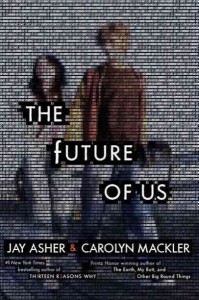 Who wouldn’t want a glimpse into their future? To see what your life is like 15 years from now, who your friends are, what your job is, where you live and if you’re happy. But how do you piece together a true picture of your future if it’s revealed in a list of “friends” you many not even know, photos that haven’t been taken yet, and random tidbits (“Cake for breakfast – yum”) that don’t make sense? For Emma and Josh in 1996, getting access to their lives in 2011 via an AOL disc that reveals their as-yet-to-be-invented Facebook pages, there are just as many gaps in the picture as there are certainties.
Who wouldn’t want a glimpse into their future? To see what your life is like 15 years from now, who your friends are, what your job is, where you live and if you’re happy. But how do you piece together a true picture of your future if it’s revealed in a list of “friends” you many not even know, photos that haven’t been taken yet, and random tidbits (“Cake for breakfast – yum”) that don’t make sense? For Emma and Josh in 1996, getting access to their lives in 2011 via an AOL disc that reveals their as-yet-to-be-invented Facebook pages, there are just as many gaps in the picture as there are certainties.
Emma and Josh have been neighbors almost their whole lives. Up until last fall, there wasn’t much that separated these 2 best friends. Then Josh misinterpreted Emma’s attentions and admitted his long-time crush on her. Emma, confused, withdrew from their close friendship, and while they are still a part of a close knit group of friends, she erected a wall between herself and Josh that she has recently come to regret. Now they’re both feeling a little lost in their lives – Emma wondering why nothing seems to make her happy and Josh reeling from the sting of losing Emma and trying to decide who he wants to be. Once they begin to unravel the mystery of Facebook, Emma becomes almost addicted to making changes in her life in 1996 to see how it affects her life in 2011, always hoping to make her present and future self happier with her life. Josh’s life in 2011 seems pretty great – married to the hottest girl in school, great tech job, kids, awesome house on the late – but when he makes attempts to get on track for that life, he discovers that maybe it isn’t where he really wants to be.
The first chapters of Carolyn Macker and Jay Asher’s The Future of Us start out a little heavy-handedly – Mackler & Asher take a lot of pains to set the time period as 1996 – making sure to point out through Emma & Josh’s internal dialogue, thoughts and comments, the state of technology, computers, the Internet, etc. It seems they want to be sure that today’s teen, who was maybe only a toddler in 1996, gets the idea that all the social media and technology that intersects every facet of modern life didn’t exist. Once they leave behind (for the most part) the history setting, the alternating narrative between Emma and Josh, the short chapters, and the use of the present tense make for a compelling, “you’re really here” story. Emma and Josh’s tinkering with their future selves, and their friends’ futures, reminded me of this past summer’s Forgotten, where a teen remembers her future and lives her present life based on events that, for everyone else, haven’t happened yet . As Emma and Josh scrutinize Facebook for clues of a happy future, they unwittingly embark on a soul-searching journey that makes them realize that all you ever really have is the present moment.
- Posted by Cori

